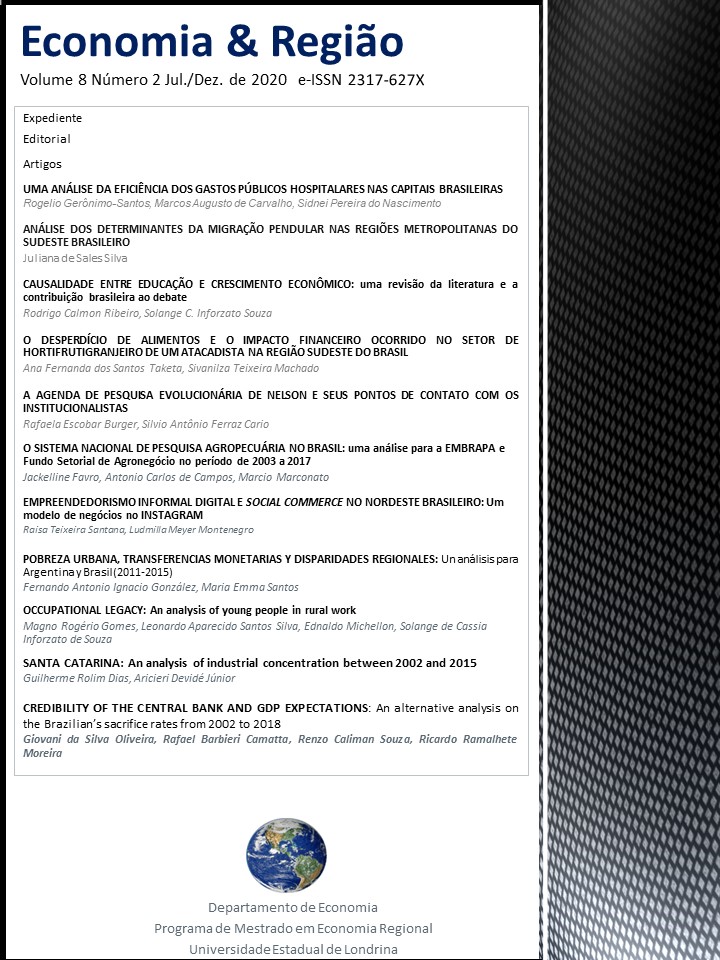Causalidade entre educação e crescimento econômico: uma revisão da literatura e a contribuição brasileira ao debate
DOI:
https://doi.org/10.5433/2317-627X.2020v8n2p41Palavras-chave:
Educação, Crescimento econômico, CausalidadeResumo
O objetivo deste trabalho é mostrar o debate sobre a causalidade entre a educação e o crescimento econômico, os principais métodos para a identificação da direção da causalidade e a contribuição brasileira para o tema. A resenha metodológica sobre a relação de causa entre a educação e o crescimento econômico revela que a sua estimação empírica se sobrepõe ao conceito de precedência temporal de variáveis. Nesse aspecto, a literatura nacional mostra que o nível do ensino fundamental mantém uma relação de causalidade em direção ao crescimento econômico; em comparação aos estudos internacionais, possui divergência quanto ao ensino superior, uma vez que as pesquisas internacionais verificaram que o crescimento econômico possui relação de precedência do ensino superior, fenômeno não encontrado nos trabalhos nacionais. Além disso, a disponibilidade de trabalhos brasileiros sobre o assunto é proporcionalmente menor do que os internacionais e replicam métodos utilizados em outros trabalhos.
Downloads
Referências
AFZAL, M.; REHMAN, H. FAROOQ, M. Q.; SARWAR, K. Education and Economic Growth in Pakistan: A Cointegration and Causality Analysis. International Journal of Educational Research, v. 50, p. 321-335, 2011.
AGHION, P.; BOUSTAN, L.; HOXBY, C.; VANDENBUSSCHE, J. The Causal Impact of Education on Economic Growth: Evidence from U.S. Unpublished paper, 2009.
ARELLANO, M.; BOND, S. Some Tests of Specification for Panel Data: Monte Carlo Evidence and an Application to Employment Equations. The Review of Economic Studies, v. 58, n. 2, p. 277-297, 1991.
ASTERIOU, D.; AGIOMIRGIANAKIS, G. M. Human Capital and Economic Growth: Time Series Evidence from Greece. Journal of Policy Modeling, v.23, n. 5, p. 481-489, 2001.
AZARIADIS, C.; DRAZEN, A. Threshold Externalities in Economic Development. The Quarterly Journal of Economics, v. 105, p. 501-526, 1990.
BARRO, R. J. Economic Growth in a Cross-Section of Countries. Quarterly Journal of Economics, v. 106, p. 407-443, 1991.
BARRO, R. J.; MARTIN, X. S. i. Technological Diffusion, Convergence, and Growth. Cambridge, Massachusetts: NBER, 1995. (Texto para discussão, n. 5151).
BARBOSA FILHO, F. d. H.; PESSÔA, S. S. Retorno da Educação no Brasil. Pesquisa e Planejamento Econômico, v. 38, n. 1, 2008.
BECKER, G. S. Investment in Human Capital: A Theoretical Analysis. The Journal of Political Economy, v.70, n. 5, p. 9-49, 1962.
BENHABIB, J.; SPIEGEL, M. M. The Role of Human Capital in Economic Development Evidence from Aggregate Cross-country Data. Journal of Monetary Economics, v. 34, n. 2, p. 143-173, 1994.
BILS, M.; KLENOW, P. J. Does Schooling cause Growth? American Economic Review, v. 90, n. 5, p. 1160-1183, 2000.
BIRDSALL, N.; SABOT, R. Opportunity Foregone: Education in Brazil. John Hopkins University Press. 1996.
BISHOP, J. The Impact of Academic Competencies of Wages, Unemployment, and Job Performance. Carnegie-Rochester Conference Series on Public Policy, 37, p. 127-194, 1992.
BOLDIN, R.; MOROTE, E.; MCMULLEN, M. Higher Education and Economic Growth in the Latin American Emerging Markets.1996.
BRUNELLO, G.; CHECCHI, D. School Quality and Family Background in Italy. Economics of Education Review, v. 24, p. 563-577, 2005.
CARDOSO, F.d.R. Educação Superior e Crescimento Econômico.2006. Dissertação de Mestrado em Economia - Universidade Federal do Rio Grande do Sul, Porto Alegre, 2006.
CASTRO, C. d. M. Investment in Education in Brazil: a Study in Two Industrial Communities. 1970. Tese (Doutorado) - Vanderbilt University, Nashville, 1970.
CHAUDHARY, A. R.; IQBAL, A.; GILLANI, S. Y. M. The Nexus between Higher Education and Economic Growth: An Empirical Investigation for Pakistan. Pakistan Journal of Commerce and Social Sciences, v. 3, n. 1, p. 1-9, 2009.
COELHO, R. de A. Níveis de Educação, Capital Humano e Crescimento Econômico no Brasil: Um Estudo sobre as Relações de Causalidade. 2006. Dissertação (Mestrado em Economia) - Universidade Federal de Santa Catarina, Florianópolis, 2006.
DANACIA, D-E.; BELASCU, L.; ILIE, L. The Interactive Causality between Higher Education and Economic Growth in Romania. International Review of Business Research Papers, v. 6, n. 4, p. 491-500, 2010.
DAVIDSON, R.; MACKINNON, J. G. Estimation and Inference in Econometrics. New York: Oxford University Press, 1993.
DIAS, J.; DIAS, M. H. A.; LIMA, F. F. Os Efeitos da Política Educacional no Crescimento Econômico: Teorias e Estimativas Dinâmicas em Painel de Dados. Revista de Economia Política, v. 29, p. 232-251, 2009.
DOLADO, J.; LUTKEPOHL, H. Making Wald Tests Work for Co-Integrated VAR Systems. Econometric Review, v. 15, p. 369-386, 1996.
EDGEWORTH. F. Y. Methods of Statistics. Journal of the Statistical Society of London, p. 181-217, 1885.
EICHLER, M. Causal Inference in Time Series Analysis. Causality: Statistical Perspectives and Applications, p. 327-354, 2012.
ENGEL, E. Der Werth des Menschen. Belin: Verlag von Leonhard Simion, 1883.
FARR, W. The Income and Property Tax. Journal of the Statistical Society of London, v. 16, n. 1, p. 1-44, 1853.
FRANCIS, B.; IYARE, S. Education and Development in the Caribbean: a Cointegration and Causality Approach. Economics Bulletin, v. 15, n. 2, p. 1-13, 2006.
GHEZ, G.; BECKER, G. S. The Allocation of Time and Goods over the Life Cycle. NBER Books, National Bureau of Economic Research, Inc, 1975.
GRANGER, C. W. Investigating Causal Relations by Econometric Models and Cross-Spectral Methods. Econometrica: Journal of the Econometric Society, p. 424-438, 1969.
GRANGER, C. W. Developments in the Study of Cointegrated Economic Variables. Oxford Bulleting of Economics and Statistics, v. 48, n. 3, p. 213-228, 1986.
HANUSHEK, E.A.; KIMKO, D.D.; Schooling, Labor-Force Quality, and the Growth of Nations. The American Economic Review, v. 90, n. 5, p. 1184-1208, 2000.
HECKMAN, J. J.; LI, X. Selection Bias, Comparative Advantage and Heterogeneous Returns to Education: Evidence from China in 2000. Pacific Economic Review, v. 9, n. 3, p. 155-171, 2004.
HENDRY, D. F. Granger Causality. European Journal of Pure and Applied Mathematics, v. 10, n. 1, p.12-29, 2017. Disponível em: https://ejpam.com/index.php/ejpam/article/view/2948 . Acesso em: 2 fev. 2019.
HOOVER, K. D. Causality in Economics and Econometrics. New Palgrave Dictionary of Economics. 2006.
HSIAO, C. Autoregressive Modelling and Money-Income Causality Detection. Journal of Monetary Economics, v. 7, p. 85-106, 1981.
HUME, D. Essays, Moral, Political and Literary. Liberty Fund Publisher, 1742.
JOHANSEN, S. Identifying Restrictions of Linear Equations with Applications to Simultaneous Equations and Cointegration. Journal of Econometrics, v. 69, p. 111-132, 1995.
JÚNIOR, L. H. d. S.; SAMPAIO, Y. Qualidade da Escola e Background Familiar na Formação de Capital Humano no Brasil. Planejamento e Políticas Públicas, n. 45, p.275-300, 2015.
KASSOUF, A. L. The Wage Rate Estimation using the Heckman Procedure. Brazilian Review of Econometrics, v. 14, n. 1, p. 89-107, 1994.
KIKER, B. F. The Historical Roots of the Concept of Human Capital. The Journal of Political Economy, p. 481-499, 1966.
KONYA, L. Exports and Growth: Granger Causality Analysis on OECD Countries with a Panel Data Approach. Economic Modelling, v. 23, p. 978-992, 2006.
KUI, L. The Interactive Causality between Education and Economic Growth in China. Peking University. Disponível em https://papers.ssrn.com/sol3/papers.cfm?abstract_id=920624 Acesso em: 20 jan. 2019.
LANGONI, C. G. Distribuição da Renda e Desenvolvimento Econômico do Brasil: uma Reafirmação. Rio de Janeiro: Escola de Pós-Graduação em Economia - Fundação Getúlio Vargas, 1974.
LINDAHL, M.; KRUEGER, A. B. Education for Growth: Why and for Whom? Journal of Economic Literature, American Economic Association, v. 39, n. 4, p. 1101-1136, 2001.
LIST, F.; HENDERSON, W. O. The Natural System of Political Economy, 1837. Frank Cass & Company, 1983.
LUCAS, R. E. On the Mechanics of Economic Development. Journal of Monetary Economics, v. 22, n. 3-42, 1988.
MEULEMEESTER, J-L. D.; ROCHAT, D. A Causality Analysis of the Link between Higher Education and Economic Development. Economics of Education Review, v. 14, n. 4, p. 351-361, 1995.
MILL, J.S. A System of Logic. Book IV, Create Space Independent Publishing Platform, 1851.
MINCER, J. Investment in Human Capital and Personal Income Distribution. Journal of Political Economy, v. 66, n. 4, p. 281-302, 1958.
MINCER, J. Schooling, Experience and Earnings. Cambridge, Massachusetts. National Bureau of Economic Research. 151p. 1974.
MINCER, J Human Capital and Economic Growth. Cambridge, Massachusetts: National Bureau of Economic Research, 1981. 125p.
MOURA, R. L. d. Testando as Hipóteses de Mincer para o Brasil. Revista Brasileira de Economia, v. 62, n. 4, p. 407-449, 2008.
NAKABASHI, L.; FIGUEIREDO, L. Capital Humano e Crescimento: Impactos Diretos e Indiretos. Belo Horizonte, Minas Gerais: CEDEPLAR,2005. 12p. (Texto para discussão, n. 267).
NAKABASHI, L.; FIGUEIREDO, L. Economic Growth, Convergence and Quality of Human Capital Formation System. Belo Horizonte, Minas Gerais. CEDEPLAR,2005. 12p. (Texto para discussão, n. 265).
NELSON, R. R.; PHELPS, E. S. Investment in Humans, Technological Diffusion, and Economic Growth. The American Economic Review, v. 56, n. 12, p. 69-75, 1966.
PSACHAROPOULOS, G.; PATRINOS, H. A. Returns to Investment in Education: a Further Update. Education Economics, v. 12, n. 2, p. 111-134, 2004.
RESENDE, M.; WYLLIE, R. Retornos para Educação no Brasil: Evidências Empíricas Adicionais. Economia Aplicada, v. 10, n. 3, p. 349-365, 2006.
ROMER, P. M. Endogenous Technological Change. Journal of Political Economy, v. 98, n. 5. 1990.
ROMER, P. M. Two Strategies for Economic Development: Using Ideas and Producing Ideas. The World Bank Economic Review, World Bank, n. 6. N. 1, p. 63-91, 1992.
RODRIGUES, A. A. F. Impacto da Educação no Rendimento Salarial no Brasil de 2001 a 2008. 2010. 101f. Dissertação (Mestrado em Economia) - Universidade Federal do Rio Grande do Sul, Faculdade de Ciências Econômicas, Porto Alegre, 2010.
SACHSIDA, A.; LOUREIRO, P. 1. A.; MENDONÇA, M. J. C. d. Um Estudo sobre Retorno em Escolaridade no Brasil. Revista Brasileira de Economia, v. 58, n. 2, p. 249-265, 2004.
SCHULTZ, T. W. Investment in Human Capital. The American Economic Review, v. 51, n. 1, p. 1-17, 1961.
SCHULTZ, T. W. The Increasing Economic Value of Human Time. American Journal of Agricultural Economics, v. 54, n. 5, p. 843-850, 1972.
SCHULTZ, T. W. The Value of Children: An Economic Perspective.Journal of Political Economy, v. 81, n. 2, p. 2-13, 1973.
SEN, H.; KAYA, A.; ALPASLAN, B. Education, Health and Economic Growth Nexus: A Bootstrap Panel Granger Causality Analysis for Developing Countries. Economics Discussion Paper Series, The University of Manchester, EDP-1502, 2015.
SENNA, J. J. Escolaridade, Experiência no Trabalho e Salários no Brasil. Revista Brasileira de Economia, v. 30, n. 2, p. 163-194, 1976.
SIMON, H. Causal Ordering and Identifiability. Hood, WC & Koopmans Studies in Econometrics, p. 49-74, 1953.
SMITH, A. A Riqueza das Nações (1776). São Paulo: Abril Cultural, 1983. v. 1.p. 101.
TEMPLE, J. The New Growth Evidence. Journal of Economic Literature, v. 37, n. 1, p. 112-156, 1999.
TODA, H. Y.; YAMAMOTO, T. Statistical Inference in Vector Autorregressions with Possibly Integrated Processes. Journal of Econometrics, v. 66, n. 1, p. 225-250, 1995.
TROSTEL, P.; WALKER, I.; WOOLLEY, P. Estimates of the Economic Return to Schooling for 28 countries. Labor economics, Elsevier, v. 9, n. 1, p. 1-16, 2002.
UCHE, E.; IHUGBA, O. A.; NWOSU, C. Causal Relationship between Government Budget Allocation to the Economic Sector and Economic Growth. Discourse Journal of Education Research, v. 1, n. 8, p. 54-64, 2013.
UZAWA, H. Optimum Technical Change in an Aggressive Model of Economic Growth. International Economic Review, v. 6, n. 1, p. 18-31, 1965.
VENNIKER, R. Social Returns to Education: A Survey of Recent Literature on Human Capital externalities. CPB Netherlands Bureau for Economic Policy Analysis, Report 00/1. The Hague, 2000.
WÖBMANN, L. Specifying Human Capital: A Review, Some Extensions, and Development Effects. Kiel, Germany. Kiel Institute of Economics, 2000. (Texto para discussão, n. 1007).
YOUNG, A.; LEVY, D.; HIGGINS, M. J. Many Types of Human Capital and Many Roles in U.S. Growth: Evidence from Country-Level Educational Attainment Data. Cambridge, Massachusetts. Harvard University, 2004. (Texto para discussão, n. 402).
YURTKURAN, S.; TERZI, H. Does Education Affect Economic Growth in Turkey? A Causality Analysis. Iktisadi ve Idari Bilimler Fakultesi Dergisi, v. 30, n. 2, p. 19-38, 2015.
ZELLNER, A. Causality and Econometrics. Carnegie-Rochester Conference Series on Public Policy, v. 10, p. 9-54, 1979.
Downloads
Publicado
Como Citar
Edição
Seção
Licença
Copyright (c) 2020 Economia & Região

Este trabalho está licenciado sob uma licença Creative Commons Attribution 4.0 International License.
Economia & Região adota a Licença Creative Commons Attribution CC-BY 4.0 International, portanto, os direitos autorais relativos aos artigos publicados são do(s) autor(es), que cedem à Revista Economia & Região o direito de exclusividade de primeira publicação.
Sob essa licença é possível: Compartilhar - copiar e redistribuir o material em qualquer suporte ou formato. Adaptar - remixar, transformar, e criar a partir do material, atribuindo o devido crédito e prover um link para a licença e indicar se mudanças foram feitas.




















